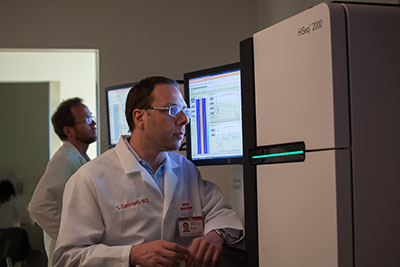Study Recently Published in Cancer Discovery Reveals New Epigenetic Pathway That Allows Chemotherapy to Kill Cancer

Dr. Cerchietti in the laboratory.
Chemoresistant diffuse large B-cell lymphoma (DLBCL) is a devastating illness that affects thousands of people each year in the United Stats, but there is good news to report. Dr. Leandro Cerchietti and Dr. Peter Martin, both members of the Division of Hematology and Medical Oncology, published a paper in Cancer Discovery in September 2013 that sheds light on the mechanisms by which DLBCL becomes resistant to chemotherapy and how those changes might be reversed.
DLBCL is increasingly recognized as a cancer affected by epigenetic dysregulation, a disruption in mechanisms involved in control of cell's DNA, such as chemical modification of DNA by methylation. In the paper, Dr. Cerchietti, Dr. Martin, and colleagues reported on resistance to chemotherapy that is associated with aberrant DNA methylation. They were able to circumvent resistance to chemotherapy with prolonged exposure to low-dose DNA methylation inhibitors, resulting in the reprogramming of chemoresistant cells, making them sensitive to chemotherapy. This exciting finding was translated into a Phase I (proof-of-concept) clinical study in which patients with previously untreated DLBCL received five days of the DNA methylation inhibitor azacitidine prior to each cycle of standard chemotherapy. The encouraging results showed that the combination therapy was not only well-tolerated, but there was a high rate of complete remission.
Dr. Martin, lead study investigator, noted in a recent interview with Internal Medicine News, that "These patients had really aggressive lymphoma, extensive disease, high IPI (International Prognostic Index), so to get these kinds of results in this kind of patient population is well, frankly, unexpected." He believes that this new therapeutic approach "has the potential to have a major impact in a variety of cancers, not just large-cell lymphoma, but it has to be administered in a way that changes the epigenetic reprogramming, not in a way that is cytotoxic."
Dr. Cerchietti stated, "Oncologists have long believed that using high doses of an anti-cancer drug is the best strategy. Our study shows that is not the case with this kind of drugs, and suggests this new approach can potentially be translated to other tumor types."
Read WCMC Press Release
Read article in Cancer Discovery
Read article in Internal Medicine News